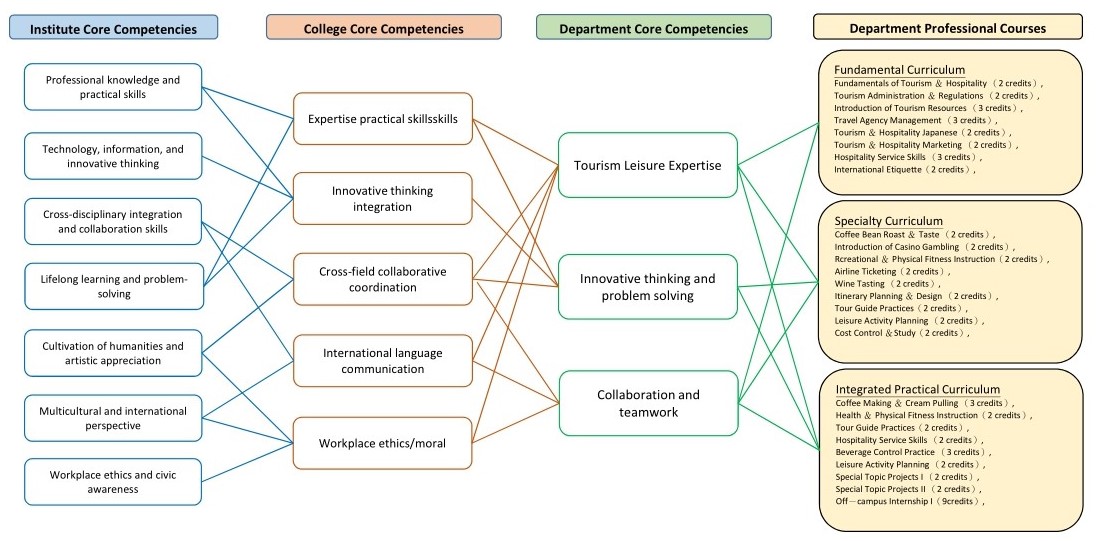Development of tourism and leisure management
Educational Objectives
The Department aims to cultivate professionals with the ability to develop and manage innovative tourism and leisure services. It aims to become a “training center for tourism and leisure professionals”, with “tourism service management” and “sports and leisure activity management” as key areas of development. Through course study, students will develop the following core abilities:
> Tourism and leisure professional skills
> Innovative thinking and problem solving
> Communication, coordination, and teamwork
Department Introduction
Currently (2025 Academic Year), the department has eight classes in its four-year daytime vocational program and one class for overseas Chinese students, with a total enrollment of 329 students. In addition to training students to acquire theoretical knowledge in tourism and leisure management, strengthening their foreign language skills and professional knowledge, and preparing them for certification exams, the department also enhances students’ practical abilities and skills through practical internships in collaboration with the industry, cultivating professionals in tourism and leisure marketing and management who are proficient in both theory and practice.
Off-Campus Internships
The department’s full-year off-campus internship program in the senior year cultivates workplace ethics and service attitudes in students. Besides learning to withstand and cope with stress, it also fosters a dedicated and sociable workforce, a strong work ethic, a sound professional perspective, the ability to plan careers, as well as enhancing their employ-abilities. All students are required to complete a full-year off-campus internship (minimum 1,440 hours) in their senior year to earn the 18 credits required for the internship. This requirement is also a graduation requirement for all students.
Curriculum Planning Development Framework
(1)Foundational courses:
These include required college courses and first-year foundational courses, such as “Introduction to Tourism and Hospitality,” “Tourism Administration and Regulations,” “Overview of Tourism Resources,” “Travel Industry Operations and Management,” “Japanese for Tourism and Hospitality,” “Marketing Practices,” “Tourism Psychology,” “Tourism English,” “First Aid and Injury Prevention,” “Hospitality Service Skills,” “International Etiquette,” and “Beauty and Etiquette.” These courses aim to cultivate interest in beginners and develop creative thinking skills and important professional attitudes in students with a solid foundation through “adaptive teaching.”
(2)Specialty Courses:
Two modules are provided for specialty courses: “Tourism and Tourism Service Management” and “Sports and Leisure Activity Management”. Students can choose one module as their major module. In addition, advanced elective courses are offered for each professional course to strengthen individual strengths. For example, courses such as “Coffee Bean Roasting and Tasting”, “Coffee Preparation and Latte Art”, “Introduction to Game Theory”, “Leisure Health and Physical Fitness Guidance”, “Sports Fitness Guidance”, “Sports Event Management Practice”, “Airline Ticketing”, “Wine Tasting”, “Beverage Management Practice”, “Tour Planning and Design”, “Team Leader and Tour Guide Practice”, “Leisure Activity Planning”, “Cost Control and Analysis”, and “Tourism Case Analysis” are offered to strengthen skills in tourism and tourism service management and sports and leisure activity management.
(3)Integrated practical internship courses:
Including “Coffee Making and Latte Art”, “Leisure Health and Fitness Guidance”, “Team Leader and Tour Guide Practice”, “Catering and Hospitality Service Skills”, “Beverage Management Practice”, “Tour Planning and Design”, combining sports and leisure activities majors with tourism services, and using integrated productions such as “Special Production (I) (II)”, “Off-campus Internship (I) (II)”, to develop students’ professional skills through teamwork and implement the concept of “learning by doing and fully integrating with the industry”.

Figure.1 Curriculum Planning Development Framework